#rather than criticism of yet another failed action
Explore tagged Tumblr posts
Text
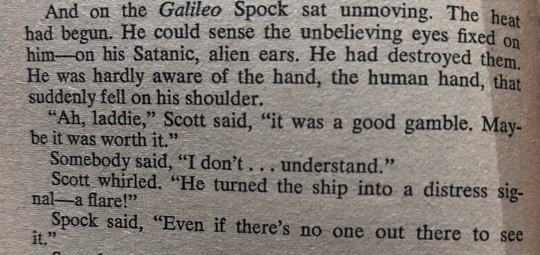
I am distressed
#that this is Spock thinking his own ears are satanic and alien#he’s tried so hard this whole time to do the logical thing and thereby save them#but having just let the impulse to act emotionally win he’s now convinced they’re doomed and it really is his fault#he can’t even justify it as the most logical choice!#and then to feel that they’re all staring at him and at the most obvious mark of his alien-ness#especially because that’s been a bone of contention the whole time#SCOTTY being the first one to see what Spock’s tried to do and to offer him COMFORT and UNDERSTANDING#rather than criticism of yet another failed action#i’m screaming#star trek tos#star trek novels#spock#montgomery scott#the galileo seven#star trek 10#james blish
50 notes
·
View notes
Note
Hii idk if you could take req but can you please do Arlecchino or Acheron!yuu? Pick whatever you like to seperate or maybe write both of them.. But idk cuz it's my first time requesting this 💔🥀
If you don't want to do one of them, that's alright but I hope you have an amazing day and please take care of yourself!!
-❄ anon
Hello ❄️anon, so I'll be doing Acheron yuu on a separate one because another also requested, so I'll be doing arlechinno one first and then upload Acheron yuu later maybe tomorrow
𝐓𝐖𝐒𝐓 𝐖𝐈𝐓𝐇 𝐀𝐑𝐋𝐄𝐂𝐇𝐈𝐍𝐎 𝐘𝐔𝐔 🕷️❌


"The Knave," Fourth of the Fatui Harbingers. A poised, ruthless diplomat. To the children of the House of the Hearth, she is their feared yet dependable "Father."
art by stasyanart on twitter
A strict and disciplined student that many came to fear and respect, always efficient and poised to be around carrying an aura of power and discipline and whoever came across them would immediately act their best to try not to anger them.
Arlecchino!Yuu’s presence at Night Raven College shakes the school to its core. They are a cold, disciplined, and utterly unyielding force that commands respect through action, not words.
Unlike the other students, they do not waste time with games, social posturing, or vanity. Their focus is efficiency, control, and ensuring survival. Many find them terrifying, but no one can deny their competence and leadership.
Arlechinno!yuu is reserved, speaks with precision, and rarely wastes words. They don’t sugarcoat anything and expect others to handle criticism like adults. And if they cant handle the truth then they are immature
Whether it’s strategy, combat, or negotiation, Arlechinno Yuu is always ten steps ahead. Azul tries to outwit them? He fails. Leona challenges them? He has to actually put in effort.
Despite their strictness, they look out for those they deem worthy. They’d never say it outright, but Grim, Ace, Deuce, and others are under their watch.
Food, money, magic, effort—everything has value. NRC’s extravagant spending annoys them. They personally cook their own meals when they think the cafeteria food is too indulgent.
Will personally teach the first year's combat, to make sure they are able to protect themselves. Their training actually boosts the strength of them.
Many students would say to avoid staring straight into their eyes because you are gonna regret what your gonna see as if your staring back towards the abyss themselves.
Despite being cold and seemingly heartless, arlechinno!yuu cares and deeply hold closely towards who they see as family like grim.
Vil admirers arlechinno!yuu as well have you seen those shoes, vil sees him as an equal as them due to how both of them carry themselves but for arlechinno!yuu they don't look down at him but seeing his ambition towards beauty is simply wasteful why focus on looks when you could focus on efficiency.
Vil once tried to recruit arlechinno!yuu towards modeling but was rejected they said they hold no interest on being on stage they prefer being in the audience watching from afar.
Sees Riddle as too rigid and blindly obedient. Would have respected his intelligence if he weren’t so trapped by his own upbringing.
They detest liars and cowards like Crowley, who put themselves in a big position but in truth they are cowards always putting work on someone else rather than owning up towards his responsibilities.
During the opening ceremony they nearly killed Crowley, they woke up a burst out of the coffin with scythe in hand ready to decapitate him, and when riddle was interrupting them explaining how they disrupted the ceremony, arlechinno!yuu immediately look at him. The eye and he immediately shut up due to his guise having some similarities towards his mother.
During an over blot immediately cut down the monster in a single slash with ease as if it was nothing compared towards them.
Many students are curious about black markings on their arms but they usually told them it's better for them to not know how and where they got these markings.
They won't coddle grim or the first year but whoever tried to lay a hand on them would immediately regret their decision for laying hands on their family. Have a soft spot for ortho wondering why there's a child in nrc even tho it's for young adults.
Not to mention them being top students toppling over Azul and riddle in grades no matter how much they get arlechinno!yuu will always be ahead against them. Many faculty respect them as in professor trein who has been a long time meeting a student as strict as arlechinno!yuu.
They don't care for status or power they see other as equals like malleus only seeing him as a person not as a prince or a god. Both of them would discuss politics and professional matters. Lilia and arlechinno!yuu would have a little disagreement on how to raise a child tho. While Lilia took a laid back approach arlechinno!yuu take a strict approach, they see silver needing more discipline as well as sebek which lilia disagree saying he's perfect the way he is.
#twisted wonderland#not canon#twst scenario#disney twst#twst headcanons#twst wonderland#twisted wonderland yuu au#twst mc#twst yuu au#twst x reader#twst x genshin#twisted wonderland x genshin impact#twisted wonderland x reader#arlechinno#genshin arlechinno#arlechinno!yuu
372 notes
·
View notes
Text
I've been a pretty harsh critic of Dr. Friedman and Polygon's general Critical Role coverage in the past, and while I think her latest article for them critiquing Campaign 3 is a fairly good one, it does in many ways cast an even harsher light on her kid-gloves handling of D20 and WBN. However, I want to talk about these two excerpts, because I think she hits on something I've increasingly noticed in Actual Play:
"This is where Critical Role’s strength — that Exandria often feels like a real, complex world — collided with the needs of a D&D campaign (a clear adversary, clear plans of action, forward momentum)."
and
"But the confused way D&D handles religion and divinity — polytheism as imagined by midwestern American Protestants — turned the question of how to handle this particular cosmic horror into a glue trap, paralyzing the players for dozens of hours of circular existential debates. Gods once mechanized (or digestible) become just another power bloc, and for players used to a system where in the end you are “basically gods,” the line gets blurrier still. And as D&D’s messy cosmology added friction to much of the campaign, D&D’s mechanics also don’t have the necessary friction for the interpersonal beats that make Critical Role compelling."
I agree with both these statements, as someone who, to be clear, enjoys D&D 5e. D&D supports a range of narratives, but all are ultimately a story of gaining power and fighting off or through a series of adversaries; if your characters are not doing that, it raises the question of why you picked a system that gives you few other options. (This is also, I should note, an increasingly loud question when it comes to Worlds Beyond Number; I fell behind for personal reasons after the Coven arc, but Brennan's initial statements about D&D as scaffolding were perhaps too true; almost every interesting mechanic, in a game with minimal combat that has thus far felt primarily focused on how the three protagonists have fundamentally different adversaries, has been homebrewed, to the point where the cosmology and baggage of D&D has felt like a liability rather than an asset).
D&D also has, in part due to such programs as D20, developed a reputation for being world-agnostic, and that ultimately isn't true. D&D does struggle to make the lines between "real divinity", an archfey or similarly powerful entity, and a L20 character feel sharply defined on a mechanical level; once you give a god a stat block, it can be killed (and on a metanarrative level, revealing the gods' statblocks in Downfall serves to make them both immense, yet also more fragile. The hit points are many, but still finite.) There are a number of questions most D&D worlds simply fail to address - and to be clear, this is not a flaw provided you have buy in. A level 2 warlock in D&D is, in most societies, an one-person lethal force unless the entire town swarms them at once, knowing that many of them will lose their lives in the effort; a level 2 warlock PC, however, is almost never, in-world, treated this way, and indeed is framed as an underdog in a harsh world despite usually having the ability to destroy the entire tavern.
D&D has also developed a (not undeserved) reputation as being The Dominant TTRPG put out by a massive corporation, and has developed a (not deserved) reputation as being itself uniquely problematic as a power fantasy, particularly by people who conveniently forget where Pathfinder came from. I've previously covered that, for all people demand non-D&D actual play, the viewership drops precipitously whenever a big AP show that made its name with D&D dares to branch out, and, related to that, I've seen an uptick in people who are excited for D&D to subvert itself. They wanted Campaign 3 to subvert these norms of divinity and heroic fantasy, cheered for it...and ultimately it was unable to do so. I don't think it's accurate to say that D&D's lack of interpersonal mechanics was the problem here, given that Campaigns 1 and 2 (and again, D20) have no such issue; but rather that since D&D's lack of interpersonal/RP mechanics require more effort from the players to initiate, the debates on the nature of divinity in a world and system that could not sustain them sapped any energy for the late-night watch conversations D&D can support when you're not fighting against it.
I think one of the many lessons we can learn from Critical Role Campaign 3 is that if you go up against D&D with an attempt to destroy it from within, your story will instead find itself conforming to the shape of its container, often to its detriment.
#i will say it is a little funny that in the end fans of Bells Hells end up arguing that the master's tools can't dismantle#the master's house. and that this is good and ok bc it would be so mean to dismantle the master's house and look at how GOOD BH are#and that on a TTRPG system level they - and frankly d20 fans too - expect the master's tools to dismantle the master's house#ie if d20 is a masterwork of anticapitalism and d&d a symbol of capitalism gone wild...well#cr tag#on actual play#i really should do a deep dive and collect all my AP posts and put them on like. a website.#anyway
196 notes
·
View notes
Note
HIII i loved your down bad hcs and figured i'd drop a request 👉👈
can i get some hcs for the lin kuei trio + kenshi w/ a gn!reader who's very clingy?
like someone who'll literally follow them wherever they go just for some physical affection and is very cuddly. bonus points if the reader is talkative too :]

LIN KUEI TRIO + KENSHI X CLINGY!READER HCS
WARNINGS: sfw, established relationship, gender neutral reader, lowercase intended, mk1 characters, mk1 spoilers, takes place after the story and before the khaos reigns dlc cuz i haven't played it yet lmfaoooo
A/N: hey... hey.... how y'all doing... erm it's been a while but here we go with another mortal kombat post!! the last time i posted about it was nearly a YEAR ago y'all i suckkkk i'm sorry. and i'm sorry it took so long for me to write, i just didn't feel like it. but here we are! also apologies for making tomas and kenshi's hcs short, i just don't have a lot of writing experience for kenshi and tomas only has like 2 minutes of screentime ijbol

with BI-HAN, he'd hate for you to be clingy while he is working. he has an entire clan to take care of, and his stress was worsened after kuai liang and tomas's betrayal. even though you may be his spouse, his main goal will always remain with the lin kuei and taking control of earthrealm. but in private, you could be physically affectionate or talk to your heart's desire.
he's not going to reciprocate your affections, though. he's not used to the concept of romance, especially from someone as vulnerable as you. his entire life he was trained to be cold and ruthless. sure, he grew up with kind brothers, but he saw their friendly nature as weakness. he'll often criticize you for being open with your feelings, but that's only because that was what he was taught. he may behave as if he resents your attachment, but he secretly enjoys the domesticity. it delights him that you are so devoted to him. his hatred for his former brothers grows every day due to their betrayal, so having you around him softens his temper, as he requires reassurance that you aren't going to turn on him. (he'll never admit that, though.) he also doesn't mind when you follow him around as long as you do not disrupt his duties or make a fool out of him. keep your affections private, and you'll stay his. you wouldn't want him to punish you for misbehaving in front of the entire clan, would you?
KUAI LIANG is far more accepting of your behavior than his colder brother. he understands that you're clingy because you care about him, so he tries to make an effort to reciprocate your affections whenever he can. but he often worries for your safety as his spouse. he worries that the lin kuei could target you if they find out about your love. you're free to be clingy, but you must keep it private.
he believes your love is one of the last good things he has left in his life. after bi-han's betrayal, his life has been one of little to no rest. having you by his side keeps his anxieties at bay for a short amount of time. you can talk to him as much as you want, and he won't interrupt you unless it's important. he would listen to your thoughts without judgement. he may question you, but he'll never judge. he may not be as talkative as you are, because he tries to show you how he feels with actions rather than words. but he still manages to keep up with you because he loves you. he's grateful to have some happiness in his dangerous life. that happiness is you.
TOMAS is similar to his brothers as he does not wish for your affections to be public, for safety reasons. however, he makes it very clear that he is appreciative of your clingy nature and never fails to turn beet red when you hug him. while he is busy building the shirai ryu, he has much more free time than his brothers. he enjoys going on walks with you and hearing you talk for hours. he stays engaged and asks questions and laughs along at your jokes, even if they aren't funny. he isn't as energetic as you are, but he attempts to reciprocate your energy the best he can. he grew up with bi-han's harsh criticisms and kuai liang's gentle guidance, but he's never had someone always excited to see him like you. you never fail to put a smile on his face and brighten a dark day.
KENSHI is now a government agent, so he often comes home to you at different times every night. he feels guilty for making you wait for him so late at night, but his concerns wash away the moment you run to hug him. he has a dangerous job, and he can handle himself despite losing his vision, but it doesn't stop him from worrying about you every time he leaves the house. just like the lin kuei trio, he wants to keep your relationship private, so you aren't hunted down like he is. he feels bad that you can't have a normal relationship with him, and it has gotten you in a few arguments, since he believes you deserve better. but ultimately, it's always worked out in the end when you reassure him that you're happy with him and nobody else. he doesn't care that you're a bit clingy, he appreciates that you care about him. it breaks his heart when he has to push you away for his job, but he just wishes to protect you, since your relationship is the best thing that's ever happened to him.
#mortal kombat 1 x reader#mk x reader#mk1 x reader#mortal kombat x reader#bi han x reader#bi han x you#sub zero x reader#sub zero x you#tomas x reader#tomas vrbada x reader#kuai liang x reader#kuai liang x you#scorpion x reader#scorpion x you#tomas vrbada x you#mortal kombat#mortal kombat 1#scorpion#kuai liang#sub zero#bi han#kenshi takahashi#kenshi takahashi x reader
313 notes
·
View notes
Text



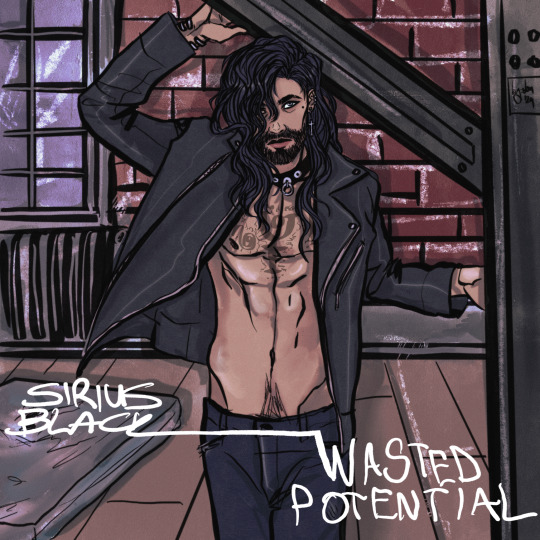


Rockstar AU album covers
I hyperfocused on a tiny detail again, so I drew all the album covers of rockstar Sirius, and also came up with a “backstory” for all. I put the descriptions under the cut, with some more details of this rockstar AU! Beware, long post! (also someone please write this)
Albums (Sirius’ age indicated):
Practically Royal (20): A sharp, system-critical punk album that dived deep into social and political commentary. With its raw energy and defiant tone, the album offered an aggressive critique of authority, consumerism, class and societal norms, aiming to spark discussion and challenge the status quo. This debut album was a huge success, launching Sirius into instant stardom and becoming an important public figure and activist in political and societal discourse. He firsts got arrested for engaging in civil disobedience / demonstrations related to an anti-government movement. He was heavily criticized by both parties because of his rebellious actions and undeniable privilidge of his noble birth.
Stray Dog (22): After his brother died, Sirius released his second, highly personal album that showcased diverse musical influences, blending multiple genres into a complex soundscape. Despite its personal depth, it struggled to find a clear identity and the eclectic style left many fans disappointed. The album was considered a flop financially, which added yet another layer to Sirius’ personal struggles and scandals.*
Orange is the New Black (29): This album contained almost entirely cover songs, a bold move that alienated fans who were hoping for original material. It failed to resonate with listeners who wanted Sirius’ distinct voice and creativity, rather than renditions of already well-known songs. The album was released a little after Sirius had served his prison sentence,* and was very despised by the audience, who referred to it as „only a desperate money-grab”. Sirius got heavily criticized, with many arguing that his time had passed and his music no longer stood the test of time, becoming overly commercial. This album was so disappointing that fans began to rediscover and appreciate his second album more.
Wasted Potential (33): After a long hiatus and a period of public controversies and scandals, Sirius returned with his forth album, which was a huge commercial and critical triumph, marking a powerful comeback. It blended his core sound with fresh ideas, and successfully proved that, despite previous doubts, he still had the musical chops and authenticity that made him a fan favorite in the first place. The album became Platinum in 3 months, and dominated the Charts, the titular song spent 3 consecutive weeks as No. 1 of the Billboards Hot 100. The album was nominated for a Grammy, and won the Brit Awards and multiple categories at the AMAs/VMAs.
Fleurs du Mal (34): In response to criticism of his „less poetic” lyrics, Sirius released an acoustic album based entirely on the works of iconic poets like Rimbaud, Verlaine, and Baudelaire. The album received a mixed reception. On one hand, it introduced Sirius’ work to a new audience, gaining significant praise in academic and literary circles. On the other hand, it alienated the core fanbase, who were more attuned to straightforward rock songs.
Supernova (41): Released unexpectedly after another extended break, this album was a declaration that, despite aging, he still possessed the fire and creativity that made him a rock icon. The album featured multiple heavy hitting rock songs, dramatic ballads, grand and epic anthems, showcasing a renewed energy that surprised his fans and critics alike. It served as both a personal statement and a challenge to the idea that aging musicians lose their edge. The album was well-received for its raw vitality and confidence. It was a commercial success as well, the titular song broke the record of „Wasted Potential” by spending 5 consecutive weeks as No. 1 of the Billboards Hot 100. The album also won a Grammy.
*Further details:
Sirius got in touble with the law multiple times for various reasons:
Reckless Driving and Substance Abuse: speeding, drunk driving, drug or alcohol-related offenses, drug possession and addiction
Vandalism and Violent Behavior: trashing a hotel room and damaging private property (charged by Walburga as Sirius damaged Black family properties), physical violence against paparazzi
(Alleged) Fraud: embezzlement and tax evasion, actually comitted by his (asset) manager, Peter, who fraudulently used Sirius’ wealth and invested using his name in questionable business opportunities, mostly regarding property handling and real estate investments.
Criminal Negligence, Endangerment and Involuntary Manslaughter: A gas leak related explosion happaned at one of the properties that Peter got involved with in Sirius’ name, which unfortunately resulted in the death of 12 people. As Sirius was the landlord/investor, and he already had a criminal record, he had to face criminal charges, including imprisonment as on paper, he was the one recklessly ignoring safety regulations. After his second album flopped financially, and he got very publicly disowned, the rumor of his teorethical money problems sort of solidified the charges. It was later proven that he was not responsible as Peter fraudulently used his name and assets without his knowledge, so Sirius got released after 5 years.
#sirius black#rockstar au#fanart#art by lau#lau draws with a tablet#long post#lau doesn’t write because of reasons#diamondmeadow#lovelymasks
109 notes
·
View notes
Text
by Ghila Amati
Although Pope Francis repeatedly condemned antisemitism, he seemed hesitant to emphasize Israel’s right to self-defense, prompting some to conclude that his postcolonial sympathies obscured the specific historical and existential dangers facing the Jewish people in the 21st century.
Tensions escalated in October 2024, when Francis quoted John 8:44 – “You belong to your father the devil” – while referring to the “spirit of evil” behind war. Though not directed at Jews specifically, this verse has fueled antisemitism for centuries.
Given the heightened threats against Jewish communities at the time, the reference seemed particularly insensitive. While the Vatican insisted Francis was simply condemning the “devilish” nature of war writ large, it did little to allay Jewish concerns and cast a pall over Jewish-Catholic relations.
THROUGHOUT HIS papacy, Pope Francis held to the notion that no modern war is truly “just.” From his encyclical Fratelli Tutti to his many public addresses, he argued that warfare in the nuclear age inevitably inflicts suffering on innocent people.
But to many Jews confronting a gloating, genocidal Hamas, this near-pacifist stance felt detached from the urgency of stopping a movement openly dedicated to their annihilation.
By criticizing Israeli military actions and Hamas atrocities in the same breath, Francis appeared to obscure the moral difference between a terror group intentionally targeting civilians and a sovereign state defending its citizens. His refusal to draw a firm distinction between aggressor and defender risked abetting tyranny rather than championing good.
Another development occurred in November 2024, when Francis cited unnamed “experts” who likened Israel’s actions in Gaza to “genocide” – even though he never used that term for the Hamas massacre of Israeli civilians. Soon after, a Vatican City nativity scene featuring a Palestinian keffiyeh went viral and exacerbated Jewish suspicions.
Although it was dismantled, and no direct link between it and Pope Francis was established, Israel’s Diaspora Affairs and Combating Antisemitism Minister Amichai Chikli went so far as to accuse the late pope of echoing an age-old “blood libel” narrative and downplaying Jewish suffering in a way that bordered on Holocaust denial.
To some Catholics, such accusations may seem overblown, yet they highlight how fragile Jewish-Catholic relations had become. In the wake of Pope Francis’s passing, both communities are reassessing his legacy.
Undeniably, he was a tireless advocate for global compassion and a staunch ally of the marginalized. Under his leadership, the Church made significant strides in rejecting its historical antisemitism.
But his unwavering commitment to pacifism during the Israel-Hamas War blinded him to the fact that it had been set off by Hamas’s butchery and to the harsh reality that confronting genocidal threats necessitates armed conflict.
By failing to explicitly condemn a group that openly calls for the annihilation of Jews, the Church inadvertently blurred a critical moral boundary. Many in the Jewish community felt that the Vatican, which had once pledged never to stand aside when Jews were threatened, resorted to ambiguous language at a moment when clear, decisive condemnation was imperative.
9 notes
·
View notes
Text
Anonymous ask: What do you think of the new Indiana Jones movie? And of Phoebe Waller-Bridge?
In a nutshell: From start to finish ‘Indiana Jones and the Dial of Destiny’ is watching Indiana Jones being a broken-down shell of a once great legacy character who has to be saved by the perfect younger and snarky but stereotypical ’Strong Independent Woman’ that passes for women characters in popcorn movies today.
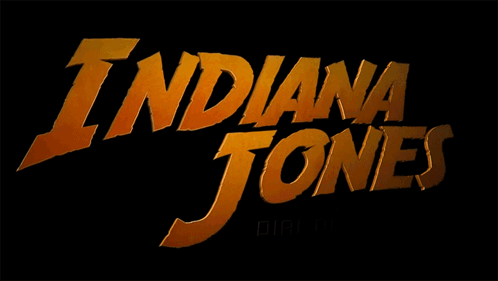
I went in to this film with conflicted feelings. On the one hand I was genuinely excited to see this new Indiana Jones movie because it’s Indiana Jones. Period. Yet, on the other hand I feared how badly Lucasfilm, under Kathleen Kennedy’s insipid woke inspired CEO studio direction, was going to further tarnish not just a screen legend but the legacy of both George Lucas and Steven Spielberg. The cultural damage she has done to such a beloved franchise as the Star Wars universe in the name of progressive woke ideology is criminal. The troubled production history behind this film and its massive $300 million budget (by some estimates) meant Disney had a lot riding on it, especially with the future of Kathleen Kennedy on the line too as she was hands on with this film.
To me the Indiana Jones movies (well, the first three anyway, the less we say about ‘Kingdom of the Crystal Skull’ the better) were an important part of my childhood. I fell in love with the character instantly. Watching ‘Raiders of the Lost Ark’ (first on DVD in my boarding school dorm with other giggly girls and later on the big screen at a local arts cinema retrospective on Harrison Ford’s stellar career) just blew me away.
As a girl I wanted to be an archaeologist and have high falutin’ adventures; I even volunteered in digs in Pakistan and India (the Indus civilisation) as well as museum work in China as a teen growing up in those countries and discovering the methodical and patient but back breaking reality of what archaeology really was. But that didn’t dampen my spirit. Just once I wanted to echo Dr. Jones, ‘This belongs in a museum!’ But I happily settled for studying Classics instead and enjoyed studying classical archaeology on the side.

I couldn’t quite make sense why Indiana Jones resonated with me more than any other action hero on the screen until much later in life. Looking like Harrison Ford certainly helps. But it’s more than that. I’ve written this elsewhere but it’s worth repeating here.
‘Raiders of the Lost Ark’ is considered an inspiration for so many action films yet there’s a very odd aspect to the film that’s rather unique and rarely noticed by its critics and fans. It’s an element that, once spotted, is difficult to forget, and is perhaps inspiring for times like the one in which we currently live, when there are so many challenges to get through. Typically in action films, the hero faces an array of obstacles and setbacks, but largely solves one problem after another, completes one quest after another, defeats one villain after another, and enjoys one victory after another.
The structure of ‘Raiders’ is different. A quick reminder:
- In the opening sequence, Indiana Jones obtains the temple idol only to lose it to his rival René Belloq (Paul Freeman). - In the streets of Cairo, Indy fails to protect his love, Marion Ravenwood (Karen Allen), from being captured (killed, he assumes). - In the desert, he finds the long-lost Ark of the Covenant, only to have it taken away by Belloq. - Indy then recovers the ark only to have it stolen a second time by Belloq, this time at sea. - On an island, Indy tries to bluff Belloq into thinking he’ll blow up the ark. His bluff fails. Indy is captured. - The climax of the film literally has its hero tied to a post the entire time. He’s completely ineffectual and helpless at a point in the movie where every other action hero is having their greatest moment of struggle and, typically, triumph.
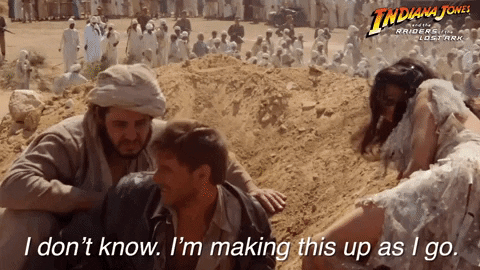
If Indiana Jones had done absolutely nothing, if the famed archeologist had simply stayed home, the Nazis would have met the same fate - losing their lives to ark’s wrath because they opened it. It’s pretty rare in action films for the evil arch-villains to have the same outcome as if the hero had done nothing at all.
Indy does succeed in getting the ark back to America, of course, which is crucial. But then Indy loses the ark, once again, when government agents send it to a warehouse and refuse to let him study the object he chased the whole film. In other words: Indiana Jones spends ‘Raiders’ failing, getting beat up, and losing every artefact that he risks his life to acquire. And yet, Indiana Jones is considered a great hero.
The reason Indiana Jones is a hero isn’t because he wins. It’s because he never stops trying. I think this is the core of Indiana Jones’ character.
Critics will go on about something called agency as in being active or pro-active. But agency can be reactive and still be kinetic to propel the story along. It’s something that has progressively got lost as the series went on. With the latest Indiana Jones film I felt that Indiana Jones character had no agency and ends up being a relatively passive character. Sadly Indiana Jones ends up being a grouchy, broken, and beat up passenger in his own movie.
Released in 1981, ‘Raiders of the Lost Ark’ remains one of the most influential blockbusters of all time. Exciting action, exotic adventure, just the right amount of romance, good-natured humour, cutting-edge special effects: it was all there, perfectly balanced. Since then, attempts have been made to reproduce this winning recipe in different narrative contexts, sometimes successfully (’Temple of Doom’ and ‘the Last Crusade’), usually in vain (’Crystal Skull’).
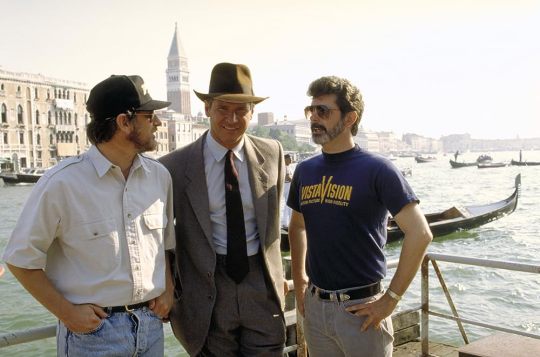
What are the key ingredients of an Indiana Jones movie? There are only four core elements - leaving aside aspects of story such as the villain or the goal - that you need in place before anything else. They are: the wry, world-weary but sexy masculine performance of Harrison Ford; the story telling genius of George Lucas steeped in the lore of Saturday morning action hero television shows of the 1950s; the deft visual story telling and old school action direction of Steven Spielberg; and the sublime and sweeping music of the great John Williams. This what made the first three films really work.
In the latest Indiana Jones film, you only have one. Neither Lucas and Spielberg are there and arguably neither is Harrison Ford. John Williams’ music score remains imperious as ever. His music does a lot of heavy lifting in the film and let’s face it, his sublime music can polish any turd.

This isn’t to say the ‘Dial of Destiny’ is a turd. I won’t go that far, and to be honest some of the critical reaction has been over-hysterical. Instead I found it enjoyable but also immensely frustrating more than anything else. It had potential to be a great swan song film for Indy because it had an exciting collection of talent behind it.
In the absence of Spielberg, one couldn’t do worse than to pick James Mangold as next best to direct this film. Mangold is a great director. I am a fan of his body of work. After ‘Copland’, ‘Walk the Line’, ‘Logan’ and ‘Le Mans 66’ (or ‘Ford vs Ferrari’), James Mangold has been putting together a fine career shaped by his ability to deliver stories that rediscover a certain old-fashioned charm without abusing the historical figures - real or fictional - he tackles. And after Johnny Cash, Wolverine and Ken Miles, among others, I had high hopes he would keep the flame alive when it came to Indiana Jones. Mangold grew up as a fanboy of Spielberg’s work and you can clearly see that in his approach to directing film.
But in this film his direction lacks vitality. Mangold, while regularly really good, drags his feet a little here because he’s caught between putting his own stamp on the film and yet also lovingly pay homage to his hero, Spielberg. It’s as if he didn't dare give himself away completely, the director seems too modest to really take the saga by the scruff of the neck, and inevitably ends up suffering from the inevitable comparison with Steven Spielberg.
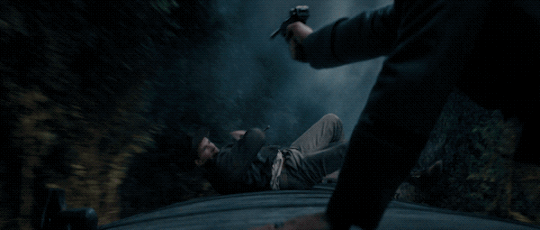
Mangold tries to recreate the nostalgic wonder of the originals, but doesn't quite succeed, while succumbing to an overkill of visual effects that make several passages seem artificial. The action set pieces range from pedestrian to barely satisfying. The prologue sequence was vaguely reminiscent of past films but it was still a little too reliant on CGI. The much talked about de-ageing of Harrison Ford on screen was impressive (and one suspects a lot of the film budget was sunk right there). But Indiana’s lifeless digitally de-aged avatar fighting on a computer-generated train, made the whole sequence feel like the Nazi Polar Express. Because it didn’t look real, there was no sense of danger and therefore no emotional investment from the audience. You know Tom Cruise would have done it for real and it would have looked properly cinematic and spectacular.
The tuk tuk chase through the narrow streets of Tangiers was again an exciting echo of past films, especially ‘Raiders’, but goes on a tad too long, but the exploration of the ship wreck (and a criminally underused cameo by Antonio Banderas) was disappointing and way too short.
The main problem here is the lack of creativity in the conception of truly epic scenes, because these are not dependent on Ford's age. Indeed, the film could very well have offered exhilarating action sequences worthy of the archaeologist with the whip, without relying solely on the physicality of its leading man. You don't need a Tom Cruise to orchestrate great moments but you could do worse than to follow his example.
Mangold uses various means of locomotion to move the character - train, tuk tuk, motorbike, horse - and offers a few images that wouldn't necessarily be seen elsewhere (notably the shot of Jones riding a horse in the middle of the underground), but in the end shows himself to be rather uninspired, when the first three films in the saga conceived some of the most inventive sequences in the genre and left their mark on cinema history. There are no really long shots, no iconic compositions, no complex shots that last and enrich a sequence, which makes the film look too smooth and prevents it from giving heft to an adventure that absolutely needs it.

And so now to the divisive figure of Phoebe Waller-Bridge.
It’s important here to separate the person from the character. I like Phoebe Waller-Bridge and I loved her in her ‘Fleabag’ series. She excels in a very British setting. I think she is funny, irreverent, and a whip smart talented writer and performer. I also think she has a particular frigid English beauty and poise about her. When I say poise I don’t mean the elegant poise of a Parisienne or a Milanese woman, but someone who is cute and comfortable in her own skin. You would think she would be more suited to ‘Downton Abbey’ setting than all out Hollywood action film. But I think she almost pulls it off here.
In truth over the years Phoebe Waller-Bridge, known for her comedy, has been collecting franchises where she is able to inflict her saucy humour into a hyper-masculine space. I don’t think her talent was properly showcased here.
Hollywood has this talent for plucking talented writers and actors who are exceptional in what they do and then hire them do something entirely different by either miscasting them or making them write in a different genre. I think Phoebe Waller-Bridge is exceptional and she might just rise if she is served by a better script.

In the end I think she does a decent stab at playing an intriguing character in Helena Shaw, Indy’s long lost and estranged god daughter and a sort of amoral rare artefacts hustler. Phoebe Waller-Bridge brings enthusiasm, charm and mischief to the role, making her a breath of fresh air. She seems to be the only member of the on-screen cast that looks to be enjoying themselves.
To be fair her I thought Waller-Bridge was a more memorable and interesting female character than either Kate Capshaw (’Temple of Doom’, 1984) and Alison Doody (’Last Crusade’, 1989). She certainly is a marked improvement on the modern woke inspired insipid female action leads such as Brie Larson (’Captain Marvel’), or any women in the Marvel universe for that matter, or Katherine Waterson (’Alien Covenant’). Waller-Bridge could have been reminiscent of Kathleen Turner (’Romancing the Stone’) and more recently Eva Green, actresses who command attention on screen and are as captivating, if not more so, than the male protagonists they play opposite.
To be sure there have been strong female leads before the woke infested itself into Hollywood story telling but they never made it central to their identity. Sigourney Weaver in ‘Alien’ and Linda Hamilton in the ‘Terminator’ franchise somehow conveyed strength of character with grit and perseverance through their suffering, while also being vulnerable and confident to pull through and succeed. Phoebe Waller-Bridge’s character isn’t quite that. She doesn’t get into fist fights or overpowers big hulking men but she uses cheek and charm to wriggle out of tight spots. She’s gently bad ass rather the dull ‘strong independent woman’ cardboard caricatures that Marvel is determined to ram down every girl’s throat. If Waller-Bridge’s character was better written she might well have been able to revive memories of the great ladies of Hollywood's golden age who had the fantasy and the confidence that men quaked at their feet.
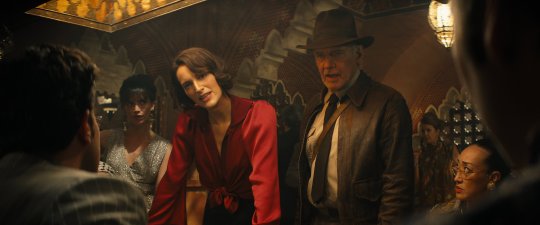
What lets her character down is the snark. She doesn’t pepper her snark but she drowns in it. All of it directed at poor Indy and mocking him for his creaking bones and his entire legacy. It’s a real eyesore and it is a real let down as it drags the story down and clogs up the wheels that power the kinetic energy that an adventure with Indiana Jones needs. ‘The grumpy old man and the young woman with the wicked repartee set off across the vast world’ schtick is all well and good, but it does grate and by the end it makes you angry that Indy has put up with this crap. I can understand why many are turned off by Waller-Bridge’s character. As a female friend of mine put it, we get the talented Phoebe Waller Bridge’s bitter and unlikable Helena acting like a bitter and unlikable man. But it could be worse, it could be as dumb as Shia LaBeouf‘s bad Fonzie impersonation in 'Crystal Skull’.
I would say there is a difference between snark and sass. Waller-Bridge’s character is all snark. If the original whispers are true the original script had her way more snarkier towards Indy until Ford threatened to leave the project unless there were re-writes, then it shows how far removed the producers and writers were from treating Indy Jones with the proper respect a beloved legacy character deserves. It’s also lazy story telling.
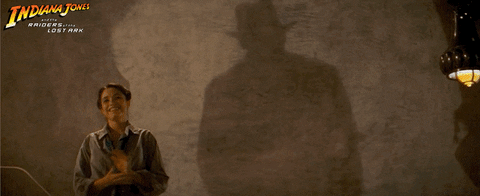
Karen Black gave us real sass with Marion Ravenwood in ‘Raiders’. Her character was sassy, strong, but also vulnerable and romantic. She plays it pitch perfect. Of all the women in Indy’s life she was good foil for Indy.
Spielberg is so underrated for his mise-en-scène. We first meet Marion running a ramshackle but rowdy tavern in Tibet (she’s a survivor). She plays and wins a drinking game (she’s a tough one), she sees Indy again and punches him (she’s angry and hurt for her abandoning her and thus revealing her vulnerability). She has the medallion and becomes a partner (she’s all business). She evades and fights off the Nazis and their goons, she even uses a frying pan (she’s resourceful but not stupid). She tries on dresses (she’s re-discovers her femininity). Indy saves her but she picks him up at the end of the film by going for a drink (she’s healing and there’s a chance of a new start for both of them). This is a character arc worth investing in because it speaks to truth and to our reality.
The problem with Phoebe Waller-Bridge’s character is that she is constantly full on with the snark. Indy and Helena gripe and moan at each other the entire film. Indy hasn’t seen her in years, and she felt abandoned after her father passed, so there’s a lot of bitterness. It’s not unwarranted, but it also isn’t entertaining. It’s never entertaining if the snark makes the character too temperamental and unsympathetic for the audience to be emotionally invested in her.
I think overall the film is let down by the script. Again this is a shame. The writing talent was there. Jez and John-Henry Butterworth worked with James Mangold on ‘Ford v. Ferrari’ and co-wrote ‘Edge of Tomorrow‘ while David Koepp co-wrote the first ‘Mission: Impossible’ (but he also penned Indiana Jones and the ‘Kingdom of the Crystal Skull’, and the 2017 version of ‘The Mummy’ that simultaneously started and destroyed Universal’s plans for their Dark Universe). I love the work of Jez Butterworth who is one of England’s finest modern playwrights and he seemed to have transitioned fine over to Hollywood. But as anyone knows a Hollywood script has always too many cooks in the kitchen. There are so many fingerprints of other people - studio execs and directors and even stars - that a modern Hollywood script somehow resembles a sort of Ship of Theseus. It’s the writer’s name on the script but it doesn’t always mean they wrote or re-wrote every word.
Inevitably things fall between the cracks and you end up filming from the hip and hoping you can stitch together a coherent narrative in post-production editing. Clearly this film suffered from studio interference and many re-writes. And it shows because there is no narrative fluidity at work in the film.

Mads Mikkelsen’s Nazi scientist is a case in point. I love Mikkelsen especially in his arthouse films but I understand why he takes the bucks for the Hollywood films too. But in this film he is phoning in his performance. Mads Mikkelsen does what he can with limited screen time to make an impact but this character feels so recycled from other blockbusters. Here the CIA and US Government are evil and willing to let innocent Americans be murdered in order to let their pet Nazi rocket scientist pursue what they believe to be a hobby. But to be fair the villains in the Indy movies have never truly been memorable with perhaps Belloq, the French archaeologist and nemesis of Indy in ‘Raiders’, the only real exception. It’s just been generic bad guys - The Nazis! The Thugee death cult! The Nazis (again)! The Commies! Now we’re back to Nazis again which is not only safer ground for the Indy franchise but something we can all get behind.
However Mads Mikkelsen’s Dr. Voller, is the blandest and most generic Nazi villain in movie history. At the end of World War II, Voller was recruited by the US Government to aid them in rocket technology. Now that he’s completed his task and man has walked on the moon, he’s turning his genius to his ultimate purpose, the recovery of the ‘Dial of Destiny’ built by Archimedes. Should he find both pieces of the ancient treasure, he plans to return to 1930s Nazi Germany, usurp Hitler, and use his advanced knowledge of rocket propulsion to win the war. In a sense then he was channeling his inner Heidegger who felt Hitler had let down Nazism and worse betrayed Heidegger himself.
So there is a character juxtaposition between Voller and Indy in the sense both men feel more comfortable in the past than the present. But neither is given face time together to explore this intriguing premise that could have anchored the whole narrative of the film. It’s a missed opportunity and instead becomes a failure of character and story telling.

Then there are the one liners which seemed shoe horned in to make the studio execs or the writers feel smug about themselves. There are several woke one lines peppered throughout the film but are either tone deaf or just stupid.
“You trigger happy cracker”- it’s uttered without any self-awareness by a black CIA agent who is chaperoning the Nazi villain. Just because white people think it’s dumb and aren’t bothered by it doesn’t make it any less a racial slur. If you want authenticity then why not use the ’N’ word then as it would historically appropriate in 1969? The hypocrisy is what’s offensive.
“You stole it. He stole it. I stole it. It’s called capitalism.” - capitalism 101 for economic illiterate social justice warriors.
“[I’m] daring, beautiful, and self-sufficient” - uttered by Helena Shaw as a snarky reminder that she’s a strong independent woman, just in case you forgot.
“It’s not what you believe but how hard you believe.” - Indiana Jones has literally stood before the awesome power of God when the Ark of the Covenant was opened up by the Nazis, and they paid the price for it by having their faces melted off. Indy has drunk from the authentic cup of Christ, given to him by a knight who’s lived for centuries, that gave him eternal life and heal his father from a fatal bullet wound. So he’s figuratively seen the face of God (sure, he closed his eyes) and His holy wrath, and has witnessed the divine healing power of Christ first hand. And yet his spews out this drivel. It’s empty of any meaning and is a silly nod to our current fad that it’s all about the truth of our feelings, not observable facts or truth.

For me though the absolute worse was what they did to Indiana Jones as a character. Once the pinnacle of masculinity, a brave and daring man’s man whose zest for life was only matched by his brilliance, Henry Jones Jr. is now a broken, sad, and lonely old man. Indiana Jones is mired in the past. Not in the archaeological past, but in his own personal past. He's asleep at the wheel, losing interest in his own life. He's lost his son, he's losing his wife. He's been trying to pass on his passion, his understanding to disinterested people. They're not so interested in looking at the past. He remains a man turned towards the past, and then he finds himself confronted by Helena, who embodies the future. This nostalgia, this historical anchoring, becomes the main thread of the story.The film tries to deconstructs Indiana Jones on the cusp of retirement from academia and confronts him with a world he no longer understands. That’s an interesting premise and could have made for a great film.
It’s clear that the filmmakers’ intention was for a lost and broken Indiana to recapture his spirit by the film’s end. However, its horrible pacing and meandering and underdeveloped plot, along with Harrison Ford’s miserably sad demeanour in nearly every scene, make for a deeply depressing movie with an empty and unearned resolution.
By this I mean at the very end of the film. It’s meant to be daring and it is. There’s something giddy about appearing during the middle of siege of Syracuse by blood thirsty Romans and then coming face to face with Archimedes himself. The film seems to want to justify the legendary, exceptional aura and character of Indy himself by including him in History. Hitherto wounded deep down inside, and now also physically wounded, Indy the archaeologist tells Helena that he wants to stay here and be part of history.
It's a lovely and even moving moment, and you wonder if the film isn't going to pull a ‘Dying Can Wait’ by having its hero die in order to strengthen its legend. But in a moment that is too brutal from a rhythmic point of view, Helena refuses, knocks out her godfather and takes him back to the waiting plane and back to 1969. The next thing Indy sees he’s woken up back in his shabby apartment in New York.
I felt cheated. I’m sure Indy did too.

After all it was his choice. But Helena robbed him of the freedom to make his own decisions. She’s the one to decide what’s best. In effect she robbed him of agency. Even if it was the wrong decision to stay back in time, it’s so important from a narrative and character arc perspective that Indy should have had his own epiphany and make the choice to come back by himself because there is something worth living for in the future present - and that was reconciling with Marion his estranged wife. But damn it, he had to come to that decision for himself, and not have someone else force it upon him. That’s why the ending feelings so unearned and why the story falls flat as a soufflé when you piss on it.
‘Indiana Jones and the Dial of Destiny’ feels like the type of sequel that aimed to capture the magic of its predecessors, had worthwhile intentions, and a talented cast, but it just never properly materialised. In a movie whose pedigree, both in front and behind the camera, is virtually unassailable, it’s inexcusable that this team of filmmakers couldn’t achieve greater heights.
The film was a missed opportunity to give a proper send off to a cinematic legend. Harrison Ford proving that whatever gruff genre appeal he possessed in his heyday has aged better than Indy’s knees. He may be 80, but Ford carries the weight of the film, which, for all its gargantuan expense, feels a bit like those throwaway serials that first inspired Lucas - fun while it lasts, but wholly forgettable on exit.
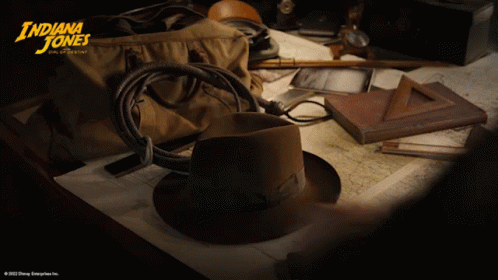
I wouldn’t rate ‘Indiana Jones and the Dial of Destiny’ as the worst film in the franchise - that dubious honour still lies with ‘Kingdom of the Crystal Skull’. Indeed the best I can say is that I would rate this film at the benchmark of “not quite as bad as Crystal Skull”.But it’s definitely time to retire and hang up the fedora and the bull whip.
For what’s worth I always thought the ending of ‘Last Crusade’ where Indy, his father Henry Jones Snr., and his two most faithful companions, Sallah and Marcus Brody, ride off into the sunset was the most fitting way to say goodbye to a beloved character.

Instead we have in ‘Dial of Destiny’ the very last scene which is meant to be this perfect ending: Indiana Jones in his scruffy pyjamas and his shabby apartment. Sure, the exchange between a reconciling Indy and Marion is sincere and touching. But that only works because it explicitly recalls ‘Raiders of the Lost Ark’. That's what Nietzsche would call “an eternal return”.
I shall eternally return to watch the first three movies to delight in the adventures of the swashbuckling archaeologist with the fedora and a bull whip. The last two dire films will be thrown into the black abyss. Something even Nietzsche would have approved of.

Thanks for your question.
#ask#question#indiana jones the dial of destiny#dial of destiny#indiana jones#lucasfilm#harrison ford#phoebe waller bridge#james mangold#steven spielberg#george lucas#john williams#kathleen kennedy#disney#film#cinema#movies#arts#cancel culture#personal
141 notes
·
View notes
Text
Short Review of Sonic Movie 3
Sonic Movie 3 met my expectations pretty exactly: it's a fun action movie for kids that takes inspiration from the video games while making adjustments to meet its own internal lore, just like the first two. So I can't really say I was disappointed by it, but it didn't really blow me away either. I think I liked the second one a little bit better.
If you're a Sonic fan who liked the other two, you will probably enjoy it. If you're a Sonic fan who disliked the other two because they're not faithful adaptations, you will feel the same about this one.
Rest is under the cut for those who wish to go in blind.
Let's get the negatives out of the way first.
I only really have one major complaint and it's that there is way too much Eggman in this movie, to the point where it feels like he has more screentime than Sonic does, let alone all four of the animal characters. I don't even mind stripping Gerald of his moral nuance and making him the big bad (although never mentioning Maria's illness makes his motivations really unclear), but like. Jim Carry's Eggman (now twofold) is better in small doses. At least he died at the end I guess (but if they do another death fakeout for him I'm going to be so annoyed). I feel like the themes they were exploring with him might've been better suited for Shadow so that he'd be a stronger foil to Sonic, which they did a little bit but again. Way more focus was given to Eggman.
The pacing is also really bad. Like, worse than the other two movies. Most scenes don't have any time to breathe before we're jumping to the next thing. Only a few emotional beats are allowed to actually linger long enough to sink in. I get that this is Sonic and we gotta go fast and all, but it feels like this movie being about 20 minutes longer or cutting out some of the Eggman shenanigans to make room for other characters would've benefited it.
They really struggled to find a reason for Sonic's human family to be involved or give them stuff to do. They're important for Sonic's arc, and Tom getting hurt by Shadow is meant to parallel Maria, but they just kind of failed to be relevant in any other way. I didn't really feel it this was as big of a problem in the first two movies. Maybe this film is just suffering from not knowing how to adequately juggle an ensemble cast.
I was a bit worried that they were going to take the story beats from Sonic Adventure 2 and turn it into pro-military propaganda, which thankfully didn't happen. They didn't really address any of the military criticism directly, and Maria's death was explicitly accidental rather than an act of callousness, though I think it was a smart move to have them shut down Gerald's research and imprison him only to build the WMD themselves using his plans and show that they were only interested in keeping it in their own hands. Other than being an inconvenience to Sonic and friends, though, they don't really act as a significant antagonist but rather just a third party in the matter. Again, better than turning them into a force for good, though.
Now for the stuff I did like.
Keanu Reeves killed it as Shadow. He's done other VA work in the past, which I think helps, but he has the exact right timbre for him and just enough emotion to sell the role.
Shadow's relationship with Maria is shown really effectively, and I like that Maria gets to have more of a personality than she really does in the games (though I have not yet played Shadow Generations so I can't speak to her portrayal there). I wish they had explored the tension between Shadow feeling like a monster a bit more, though, as well as my aforementioned gripe that they removed Maria being terminally ill from the story (which I feel is important to her character and her relationship with Shadow).
The fight scenes and action sequences more generally were really cool. I loved both Sonic v. Shadow fights, especially the first one with Shadow on his motorcycle and Sonic on foot zooming through traffic.
Special effects and CGI were also well done and felt very grounded. All of the characters look so soft and I want to pet them so bad. I love the glitter effect when Sonic and Shadow go super, too.
While the scene itself felt a little forced, I did enjoy the chao garden restaurant. I want to eat a chao bao.
I completely called BOTH characters in the post-credits reveal. My thought process was that if they didn't put Amy in the 4th movie (which you know they are going to be making) it would be a crime against me personally and generally a bad move to put in another male character before her, and if they're bringing in Amy it makes sense to bring in Metal as the new threat, especially since they concluded Shadow's SA2 arc in this movie and (supposedly) killed off the Eggmen. I look forward to hearing more about it.
I think I'm still kind of in awe that I live in a world where my favourite blue hedgehog not only gets a big screen appearance, but a whole film series -- one that doesn't suck and is actually successful, even! I feel like the cultural attitude towards Sonic has shifted much more favourably and the films are getting more people interested in the franchise as a whole. In the threatre I was at, there were other adult fans there seeing it with their kids, it was very cool. So even if I have my gripes with them as a life-long fan, I feel they are definitely a net positive and I am glad they exist.
10 notes
·
View notes
Note
i also really liked gamzee back in the day!! i was always kinda upset more effort wasn't put into trying to help him get better- especially when it got to the point an endearing character was just written off to be eternally a villain. so many time shenanigans to help bring back others/help others mental health, and yet gamzee was always just written off as a crazed murderer after a certain point?? felt like he stopped being a character and just became a force of nature. i like your more in depth look into the specific trauma he faced, makes him more like an actual person!
im so glad you like my interpretation of gamzee!! i was always really upset by how he was completely denied redemption after being introduced as a such a sweet and neglected kid who was in touch with his feelings enough to entirely reject acceptance of violence in his society. the narrative treats him really weirdly, i'm so glad i can talk about gamzee redemption+positivity with others!!
another thing i think about a lot is how rage is introduced in the narration as a biological function in highblooded trolls, but gamzee is still seen as culpable for his actions while in the rage state. tbf, its terrifying, but rose was never blamed for being manipulated by doc scratch into becoming grimdark the way gamzee is into becoming rage induced. it's all very weird. but also, i think moirails existing to 'tame a highbloods rage' is completely fucked and victim-blamey in a way, like 'oh you failed to calm his rage that's why he's bad now' and being built this way sets up a negative relationship. karkat's conflicted love and fear of gamzee makes me very sad and i dont think he should have the responsibility of caring for gamzee alone. it bothers me in fics when karkat cares for gamzee alone, because i dont think karkat's feelings for gamzee are unique; karkat's got like, four best friends. more even. sollux, terezi, kanaya, gamzee and dave all end up close to karkat and i think acting as a community would be more important and effective than a lone moralliegence with any one of them. bugs work together moment.
i'm also very invested in stories about creatures coexisting and caring for another who are biologically distinct, which i think i loved about the trolls from when i was 13. i really liked that the trolls were struggling against their 'fates' and the heavy pressure of biological essentialism in their society. i remember reading inverted caste fics where the same traits were instead seen as weaknesses rather than romanticized as strengths and being totally fascinated. thats why in bugstuck rage isnt thrown out as a concept, but instead changed as something similar to a prey drive in animals. some of my original fiction is gonna be all about stuff like this, acting as criticism and discussion of media like zootopia and beastars. im embarrassed to talk so much but thanks for listening! gonna reblog this with some more info
35 notes
·
View notes
Text
some thoughts on Action Button Reviews
[originally posted december 22nd 2023]
ANONYMOUS ASK: Not a recommendation because I know you've already seen it, but I remember you (this being like a year ago) calling Tim Rogers' action button reviews boku no natsuyasami something along the lines of "a triumphant demonstration of what's possible in the video essay medium". I was wondering if you could elaborate, provided it hasn't been too long. I recognise I'm blasting you from the past here lol. It was one of the few hours-long video essays that I didn't mind sitting through, though I'm still not sure it quite justifies its length. Tim's delivery helps significantly there, in a way that reminds me of Caleb Gamman's casual/improvised-feeling but thoroughly scripted shtick.
oh i still think Tim Rogers is hands down the best in the biz. i've watched the Action Button reviews multiple times, i've got a davinci resolve project with all his videos in, studied them under a microscope and taken lots of notes. i think his work absolutely does justify the length, because rather than trying to say Everything There Is To Say about a game, he instead focuses on digging into the game's relationship with his own hyperspecific subjectivity. i don't know how else to describe the Action Button reviews except as literary media criticism, using incredibly in-depth analysis as a jumping off point for discussing how these games shape us and the culture, the role they occupy at various stages of our life, and how who we are at any given moment is just as important to our opinion of a game as the game itself. sooner or later i want to do a full-on VIDREV on his stuff, probably in video essay form, but consider this a first draft overview of why i find his work so special.
there's little things. despite the length of his videos, he never fails to get to The Point (his term for the thesis statement) within five minutes of starting the essay proper. he is a talented and quick-witted tour guide, funny and clever and philosophically ponderous all at once. his work is clearly designed to reward multiple viewings, yet never fails to feel complete on a first watch. he writes with a precision of language that'll knock your socks off if you let it, especially if you're willing to go with him on his seemingly non sequitur tangents. but it goes a lot deeper than that.
i just don't think anyone else is putting nearly as much time, effort, and thought into the moment to moment particulate matter of his video essays than Tim Rogers. there are a ton of little mistakes that quite a few essayists make as a result of only doing one or two complete editing passes, or otherwise not sitting down and watching their video start to finish at multiple points in post-production. things like bad audio mixing, cut-off breaths and sounds that ought to be removed, stray frames from footage creating accidental jump cuts, flubbed line deliveries, misaligned overlay elements, sloppy compositing, the list goes on. it's no great sin to make these mistakes, mind-- no one's being commissioned, most essayists aren't professional editors, there's no quality control or review board or institutional best practices. it's the difference between giving the kitchen a quick once over with a rag and getting on your hands and knees to scrub every stain with a toothbrush. most people don't have the time it takes to do the latter, aren't getting paid enough, and the returns on putting the effort in are impossible to measure and therefore, practically speaking, nonexistent.
but as someone who tries to put that kind of work in (not always successfully), i can always tell when another essayist has done the same. longform video essays in aggregate tend to be messy, under-structured, rambling; they often arise out of an essayist's desire to say everything they could possibly say on a subject. not only is this an impossible task, it makes for a pretty dull viewing experience to boot. what i find so impressive about Tim Rogers' work is that despite their length, his videos are relentlessly structured. the attention to fine details in the moment-to-moment edit across the whole runtime is astonishing; that the script itself is so internally integrated never fails to make me furious (with professional envy). he always has a lot to say, not all of which is strictly speaking essential to the analysis, but nothing ever feels so indulgent that it drags the rest of the essay down in my estimation. he often repeats information, but he does so very strategically and in a way that's meant to help the viewer follow a thread from start to finish. i also think his presentation style goes a long way towards hiding how much effort he puts in, how relentlessly curated these things actually are in spite of their length. he's talked extensively about how much he cuts from these videos (most prominently is story 5 from the Cyberpunk 2077 review, which went from over an hour in length at first draft to, eventually, just over a minute), how he watches them back over and over and constantly makes fine adjustments. that work won't be apparent to everyone watching, but it's exceedingly apparent to me.
and then there's the cherry on top of it all, which is the fact that the Action Button reviews are constructed as being part of "seasons" that have a planned thematic throughline. taken as a whole, season 1 is a completely unique work of literary metacritical nonfiction, a series of six reviews (Final Fantasy VII Remake -> The Last of Us -> DOOM -> Pac-Man -> Tokimeki Memorial -> Cyberpunk 2077) that use specific games to talk about trends in game design, trends in gamer culture, the history of games development, all through an astonishingly earnest and open autobiographical document of Tim Rogers' own professional and personal life, which is given particular weight by his astonishing capacity for near perfect recall from early childhood. they are the clear result of a life spent thinking about and writing about and talking about games in between all the rest of his life, neither of which was ever truly separate. i know i'm throwing around a lot of superlatives here, but i really do adore these essays. i think a lot of folks doing longform games reviews try to achieve a sort of technical objectivity, limiting the scope of their analysis to strictly what's in the game (and often only that which involves numbers, leaving any narrative or thematic components to a brief aside at the very end). the Action Button method should fall into that category, and yet Rogers himself uses its technical objectivity as an anchor around which flows an endless and unquantifiable ocean of subjectivity, where game mechanics and thematic elements mix forever. each subsequent review drops a new anchor, and thus begins to compose a map whose purpose is as much a matter of self-reflection as it is pure education or analysis.
but i really do think it's with the first (and so far only) episode of season 2, his review of Boku no Natsuyasumi, that you can really see the cunning of what he's been up to all along. i often find myself thinking about his reflections on returning to Kansas ("it took me back to a place i had never never been"), on why people rewatch movies and replay games ("our memory only records the cold parts"), on the futility of trying to recapture the past ("places don't remember us"), on the screaming terror of our own looming mortality ("meanwhile our shattering animals"). i just know those quotes off the top of my head, man, that's how deep in it i am. the Boku no Natsuyasumi review is a masterpiece, and the ways it breaks from the style and approach of season 1's reviews only strengthens the choices he made in season 1, because suddenly we realize that they were choices. that's the artfulness of this series, in my opinion: it starts as, seemingly, a relatively bog-standard "i'm going to review some video games and make some jokes and tell some stories along the way" type joint, but slowly reveals to you essay by essay just how little of this project was automatic, unconsidered, arbitrary, and that its aims were never so miniscule as "tell you why a video game is good". there are themes running throughout the entire series, repeated phrases and ideas, theories of mind and play that build in the subtext, accruing like memories, subtly building mass until you look back and realize that what seemed like a random selection of topics was, in truth, premeditated with a conspiracist's attention to detail.
and yet despite all this high-minded gobbledygook, these videos are relentlessly watchable and entertaining. i don't always agree with his takes (i was particularly frustrated that his exploration of "every cyberpunk game" omitted the flood of relevant titles that came the indie sphere over the last decade, like Cloudpunk and Read Only Memories), but they're not the kinds of disagreements that would make me sour on his work overall, and anyway the experience is so much more valuable than something as rote and immaterial as an opinion. there's so much more i could say (and inevitably will say, someday), but there you go, that's a rough gloss on what i like about the Action Button reviews.
19 notes
·
View notes
Text
Ok so we've all went through some stages regarding the finale and The Great Divorce (or lack thereof) in S5.
I'm not a patron so I have no idea which turn the plot is going to take in reality, but after some insight from the others I've noticed which way would have been the most enterteining for me.
So a lot of people already noticed that Arthur probably isn't going to be pissed at John all that much. Yeah the situation isn't peachy but they had worse, and I don't even mean like "part 18 The Madness" kind of worse. Whom Arthur took his rage on was Kayne, so the "you lied" might have referred to him as well. (REALLY, THANK YOU to those who noticed that, it made the finale MUCH better for me, although it was good and fun as is.)
If Arthur IS mad at Kayne:
Why did he sound so defeated in the end? Was it an act to gain some time to figure out how to get out of this predicament? Or was he shocked to witness two of his allies die or disappear (and I think he IS worried for Noel a fair amount), maybe spiraling to "everyone around you dies" and "nothing gold can stay" as a possible future implication again?
A fun part for me would be if there is some self-blaming, too. Because after hearing the whole story it's easy to arrive to a horried realization: after Arthur's deal John was supposed to be safe, and he wasn't, therefore, Arthur failed him.
Even though getting John back with no memory was selfish (because erasing the memory would have critically affected John when he didn't have a say in it, and that's obviously messed up) and not ideal (it still put him at least with his friend instead and gave a chance to develop on his own again rather than being consumed by the King, which... yeah... I often forget how fucked up Arthur's behaviour with Yellow actually was from this POV :')), it still helped them both. They had better chances at survival together rather than on their own. It wasn't the worst outcome, Arthur didn't betray his friend. John being safe(-er) was an equally important part of the deal as Arthur not being alone. But since Kayne didn't hold his end of the bargain, John wasn't just in danger. He was in the Dark World, for indefinite amount of time. That was a complete opposite to the conditions of the deal. If Kayne didn't strike another deal with John, they wouldn't have met again, probably. John would have stayed in the DW while Arthur could still have his life and a chance at a new friendship, however sour it turned in the end. So, in a distant, inderect way it was like Arthur was betraying John while not even knowing this. Because he thought he could trust Kayne on this deal. It's not exactly logical and is rather a stretch but it's easy to leap to this conclusion, especially for someone with self-depricating tendencies like Arthur's. He's doing better but I don't think he's completely past it yet. He was failing someone dear to him without knowing, again. We know how he feels about that.
Moreover, we know how Kayne emphasises time and again how powerless John is before him, but Arthur is just as helpless. His rage at Kayne seemed to die out in a span of a few minutes, giving way to a lifeless "I'll come" after Kayne's demonstration of power. Which feels unltimately out of character and I know HG knows his characters well, so there HAS to be an explanation and I'm just... WHICH ONE GRRR I NEED TO KNOW!11 He may be furious about Kayne's actions but still not be able to do anything about this. And in my mind this relates to the talk about faith he had with John: that if he believed in God, Arthur would have had to believe all the deaths around him, as well as Faroe's, was God's plan, and he just can't agree with that. Not said but I think implied: it would have meant that some very powerful entity decided to kill or hurt a person he deeply cares about with his own hands/ignorance, and Arthur doesn't have a say in this while being the one at fault. It's the same here.
Oh, wait, this isn't even the second time it would have happened! It's the third, the second was John's doing, with Parker's death. Arthur has a streak!
So all in all, if the finale revelations don't trigger some trauma in this department that needs dealing with, I'd be a bit sad. But not much, part 40 gave A LOT of new opportunities, so I feel like a kid in a candy store anyway. I wonder which ones are going to be explored in the show, and will be waiting for the ficwriters to do their magic, too :D
#malevolent podcast#malevolent spoilers#arthur lester#john malevolent#john doe malevolent#kayne malevolent
25 notes
·
View notes
Note
Does your OC judge themselves by the same standards as they apply to others? Or are they sometimes hypocritical in condemning others for faults they also possess? Or perhaps they find it easier to forgive others for things that they cannot abide in themselves?
Seven Forms Of Love || Open
Hey-yo, thanks for the ask! Let's see how this one goes eh?

You've found one of the critical flaws of Jason's - he has extremely high standards for himself due to his past. He was trained by the clergy to be perfect, and thus he judges himself with far higher standards than he would for others. If he's not giving it his all, he's failing, and if he's failing, people are dying.
He's usually more lenient with other people. They don't have the same expectations on their shoulders most of the time. They weren't willingly drafted into this (neither were you, Jay my boy), and thus they shouldn't be judged nearly as harshly.
That being said, if he notices he's judging someone for a trait he knows he possesses, he turns it inward first. Work on himself before he can address someone else.
Rest are under the cut!

Vent is an odd case of not really judging someone based on any standards - rather, he expects most people to be greedy, selfish, self-serving, manipulative, violent or any combination of any of those traits. The less of those traits are shown, the more fondly he'll regard someone.
So in his case, he has rather negative expectations of everyone, and when you expect the worst... well it's rather easy for him to forgive and forget when you aren't a perfect angel around him. At least you're few shades lighter than the rest of the mass?

Howler is one of the most forgiving, helpful and understanding souls you'll ever meet. No judgement from them - well, usually. They know that sometimes we do what we must to survive, that there is no honor among survivors. That not everyone had the upbringing they had.
There are few exceptions here and there - and Howler has a talent of reading people, for someone who spent most of their adult life around same 10 people or so. Cruelty for the sake of cruelty for example will set the alarms off, and believe it or not - Howler can tell if you lied to them about your regretting your worse behaviors.
Not that they would hold lying to them against the liar. It is, yet again, just another way to survive...

Jydirot absolutely judges everyone with his standards. His standards being 'Don't be a dick to kids', and 'Help those in need, if it's within your power'. HOW you do the latter is absolutely up to you, that one he isn't too stingy about.
Jydi is goody two shoes and a goofball, but he's also bloody serious about those two standards. Mainly because he failed to uphold them for the longest time, and it was only during his time in the Brume that he started to realize how wrong his worldview had been - so he's over-correcting something fierce.
He's quite harsh on his past self, and while logically he understands he was under the Dragonsongs influence he can't help but wonder if he'll ever make up for the damage he caused.
He reacts rather strongly on the failure of those standards; If it's anyone else, they get either a scowl (oh no) to straight up punch depending on the severity of the taken actions. If he himself fails those standards, he works on the double to make up for it.
#thanks for the ask!#ask game#ffxiv oc's#Jason Windsaga#Vent Rat#Howler Kore#Jydirot Deresnels#FINALLY Howler soft response!#Sorta it's still kinda bad if you read all of it but still#Also Jydi's overdramatic as always
4 notes
·
View notes
Text
These Are The Most Hypocritical Things About Each Zodiac Sign
Let's face it; we've all been hypocritical at some point in our lives.
We all like to pretend we always talk the talk and walk the walk, but the truth is that sometimes we just don't do it. No matter how good our intentions, it's very easy to find ourselves being hypocritical even when we're on our best behavior.
We don't set out to be hypocrites. It sort of just happens.
Though we'd all love to be coherent in what we say and what we do, the truth is that we're all humans, and we make mistakes, particularly when we don't realize we're making them.
#1 Aries
If there's something Aries dislikes, it is being taken advantage of.
They know they're talented and enjoy it when people appreciate them, but when that appreciation comes with requests and demands? That's a whole other story.
That said, Arieses have no problem taking advantage of other people's talents; They see it as recognizing their skill and bowing to their expertise and fail to realize just how annoying and demanding they can come off as.
#2 Taurus
Tauruses hate stubborn people, which is hilarious because it doesn't get more stubborn than a Taurus.
In a way, it makes sense. A stubborn person will always clash with another stubborn person, so it's no wonder that Tauruses can't stand it when people oppose them and refuse to listen to reason.
However logical as their reasoning may be ("I'm right, they're wrong."), it doesn't make it any less hypocritical, yet we all know Taurus is too stubborn to recognize it.
#3 Gemini
Geminis want directness in their lives. They don't want people beating around the bush; They want to get the information they want as efficiently as possible.
Too bad Geminis are the masters of passive-aggressiveness, and they prefer to imply things rather than stating them outright.
No matter how much they claim to like directness, they only like it when it comes to subjects and situations they're comfortable with. As soon as things get rough, they'll start dancing around the issue to avoid the awkwardness that comes with it.
#4 Cancer
Cancers treasure independence and autonomy, both when it comes to them, their friends, their families, and their partners.
At least, that's what Cancer claims they want.
Indeed, they treasure their autonomy and independence, and they're happy when their loved ones have theirs. Provided, of course, that their loved ones are willing to include Cancer into everything, and are willing to drop everything whenever Cancer demands it.
Though they'll deny it, Cancers can be incredibly clingy, and though they're happy to see their loved ones succeed without their help, they still want to be involved in everything that happens, no matter how big or small.
#5 Leo
Leos are natural-born leaders who can't stand it when other people don't follow their orders, but they refuse to follow orders issued by someone else.
It doesn't matter if they come from a superior or someone with more experience. As far as Leo is concerned, no one is Leo's boss but Leo.
This approach works wonders when Leos are the ones in a position of power, but for every other Leo out there? It certainly paints them as hypocritical.
#6 Virgo
There's nothing Virgo loves more than dishing out advice, whether or not they were asked for it.
Too bad Virgos refuse to take other people's advice.
While they'll be gracious about it, they'll also chuck said advice right out of the window. They appreciate it when others advise them, but they carry on doing their thing.
As far as Virgos are concerned, no one gives better advice than them.
#7 Libra
Libras hate it when people are superficial, but can't help but to be superficial themselves.
Though they're quick to judge people based on their appearance, comment on other people's looks, or criticize someone else's actions, they'll take it personally if someone does the same to them.
Other people are superficial jerks. Libras just "say it like it is."
#8 Scorpio
Scorpios have a huge double-standard when it comes to honesty. They hate it when people lie or hide things from them, but they have no problem doing it to others as long as they can justify it to themselves.
Little white lies are okay when Scorpio does it, but are a big deal when someone else does it — lying by omission? "It slipped their minds," but if something slips someone else's mind, then they're purposefully hiding things from them.
#9 Sagittarius
Sagittariuses like to think of themselves as thoughtful and considerate; The kind of person who takes everyone else's feelings and needs into consideration, often while sacrificing their own time and energy in the process.
While the attempt is definitely there, Sagittarians often do what they think others want, often to the detriment of the people they're trying to help.
They might do or say something that hurts the other person without realizing it, and then they'll feel insulted when the target of their attention acts insulted.
They're not hypocritical, as much as they're just distracted.
#10 Capricorn
Capricorns like to think of themselves as calm and collected. They love projecting an air of self-assurance and positioning themselves as a consistent and confident presence.
Too bad they tend to fly off the handle, the second things start to go wrong.
Some might be able to keep the veneer while a crisis is going on, but once things slow down? They crumble.
#11 Aquarius
Aquarians want to come off as spontaneous but wish to have control over every situation.
Yes, they love the idea of going into a surprise picnic or being spirited away into an all-paid vacation, but the food needs to be the one they like, the colors of the blanket need to be just right, and the destination needs to be perfect.
Otherwise, their spontaneity will fly right out of the window.
#12 Pisces
Pisces are the kind of person that will join a new trend, guilt everyone around them to join it, and then make excuses for themselves.
If they're on a diet, they'll tut the benefits left and right, invite friends and family to join, micromanage everyone else's meals, and then, once alone at home; they'll order in some pizza and eat to their heart's content.
Worse of all is that they're not doing it to be controlling. They're just really good at justifying all kinds of exceptions for themselves.
#Zodiac#Zodiac Signs#Zodiacs#zodiacsign#zodiacsigns#ZodiacFact#zodiac facts#astrology#astrology signs#Aries#Aquarius#Cancer#Capricorn#leo#libra#Gemini#virgo#Pisces#Sagittarius#taurus#scorpio
22 notes
·
View notes
Note
Have u played brothership yet? Some are saying there's aspects of the game that are confusing and its making me nervous but i dont wanna spoil
Hello! 😊 I’m in the middle of playing it now. I’ve only gotten past Rumbla Island and a little bit of Twistee Island, which is one of two islands I’ve decided to go to first. So, I’m only aware of two confusing/criticized aspects so far. Both of them relate to Luigi’s game mechanics that divert from those that have been consistent in the series’ previous games. Rather than having you make both bros jump when leaping from one platform to another, Luigi automatically jumps, leaving you to only have Mario jump. And the button for Luigi’s action selection during battle changes from B to A, the same as Mario’s, then it switches back to B when initiating his attacks.
The latter is the one I’ve been struggling most to adjust to. Like I’ve failed Luigi’s attacks at times by pressing A instead of B for his first battle move. Keeping my thumb on one button for Luigi’s action selection and attacks has been so hardwired into my brain that I often don’t think about having to switch buttons now 😅
These different mechanics take getting used to, and I’m not sure why the changes were made, but fret not! I’m loving the story, explorations, music and new characters so far! Overall, my positive experiences with these other aspects overrides the minor issues I’ve had with the game mechanics, but that’s just me 😁
#Riley plays M&L Brothership#mario & luigi brothership spoilers#m&l brothership spoilers#mario & luigi brothership#m&l brothership
4 notes
·
View notes
Text
New Year, New Deity, Day 23: Low-Level Divine Spells
We've looked at feats, and now we're going to look at spell selection! There are a LOT of divine spells, and I'm going to be focusing on 3 spells of each rank that you should consider to put into your daily preparation rotation. Optimal preparation will require you to venture beyond these suggestions, but this should help you pick out a solid baseline!
Rank 1
Bless - With the remaster, Bless now looks like a very attractive option. The Archives haven't shown it yet, but bless now starts as a 15 foot emanation, making it much easier to benefit multiple party members upon casting the spell (such as with a flank buddy), and making it a little easier for Cloistered Clerics to have a bit of breathing room away from enemies.
Command - Command can blank most of a turn from a dangerous creature. Flee could theoretically eat two actions from a melee boss, as would drop prone. It also prevents reactions until the affected creature's turn, and many commands can cause reactive strikes. It's consistently strong, even into higher levels. The one knock is that it does nothing on a success.
Runic Weapon - What was once Magic Weapon pre-remaster is still just as powerful. Although the spell falls off hard, it can offer a powerful early boost to your martial allies, almost doubling their damage output before striking runes are obtained.
Rank 2
Blood Vendetta - While the damage may not seem like a ton, I'm a big fan of this spell for it's action efficiency. Over the course of the spell, it likely will do damage on par with other second level spells, but at the cost of a reaction rather than the standard 2 actions. While it doesn't hit every creature, and it does require a specific trigger, I believe the times that it is great outweigh the times it isn't.
Restoration - Some conditions such as stupefied or enfeebled can practically end a creature's adventuring day, making them far less useful. Restoration ensures the party can continue on, even when facing a debilitating debuff.
Spiritual Weapon - Spiritual Weapon gives you a decent ranged attack each turn for 1 action, allowing you to spend your other 2 actions casting another spell that doesn't contribute to MAP. The action efficiency is strong, though the lack of a strong non-MAP attack cantrip does knock it down from being a true all-star.
Rank 3
Fear (H+2) - Fear at 3rd rank is a fantastic mass-debuff spell. Frightened 1 on a success is still solid, and frightened 2 strongly neuters a creature. If they happen to critically fail, you've essentially removed them from the fight, as you will have mopped up most of the other creatures by the time they are back in it. (And of course, 1st rank Fear is also always solid, but it truly shines at 3rd rank).
Heroism - This is a great buff option, and if you suspect or know a fight is coming soon, it is one of the few spells that can be pre-cast, as it does last 10 minutes. Slap it on a fighter and watch them go to town.
Vampiric Feast - I like this spell better on Warpriests, though cloistered clerics can still use it reliably with Reach Spell. It's decent damage output, and it gives you survivability in the form of a nice bump of temp hp.
#pf2e#cleric#divine spells#one of my favorite options in undead-heavy campaigns is disrupting weapons. Positive damage for everyone!
7 notes
·
View notes
Text
Mexico will have its first woman president following a landmark vote on June 2, 2024.
After an election period marred by violence, ruling Morena party candidate Claudia Sheinbaum, a former Mexico City mayor, emerged as the victor with about 60% of the vote – a larger share of the vote than her mentor and predecessor, President Andrés Manuel López Obrador, won in 2018. Sheinbaum beat rival Xóchitl Gálvez, a senator for the center-right National Action Party, who trailed with less than 30% of the vote.
Acknowledging the significance of the occasion, Sheinbaum said: “For the first time in the 200 years of the republic I will become the first woman president of Mexico.”
But as scholars who study politics and gender in Mexico, we know that optics are one thing, actual power another. Seventy years after women won the right to vote in Mexico, is the country moving any closer to making changes that would give women real equality?
Uneven fight for gender equality
Women now represent half of Congress, after electoral reforms nearly a decade ago mandated gender parity in nominations to Mexico’s legislatures. And two women, Ana Lilia Rivera and Marcela Guerra Castillo, occupy the top posts in both chambers of Congress. Meanwhile, Norma Lucía Piña is the first woman to serve as chief justice of Mexico’s Supreme Court. Preliminary election night results also favor Sheinbaum’s Morena party, giving them a supermajority in Congress. As such, Sheinbaum will very likely have ample support for a feminist political agenda should she pursue one.
But electing women to high office doesn’t necessarily shift power in meaningful ways. It’s what experts on women in politics call “descriptive representation” – when political leaders resemble a group of voters but fail to set policies designed to protect them. In contrast, “substantive representation” occurs when officials enact laws that truly benefit the groups that they claim to represent.
Scholars who study the difference between the two, including Sonia Alvarez, Mala Htun and Jennifer Piscopo, have found that wins in public spheres, such as the right to vote or hold office, have rarely led to progress for women in private spaces – such as the right to reproductive freedom or protections against domestic violence.
In other words, Mexico may have surpassed many countries, including the U.S., in promoting women to political leadership positions, but it still hasn’t shed its stigma of machismo and its history of authoritarianism.
In the 1990s, a resurgent feminist movement throughout Latin America led to major breakthroughs in women’s rights. By the end of the decade, many countries had passed legislation against gender-based violence and reforms requiring gender quotas in party nomination lists. In the past 17 years, seven women have been elected president across Central and South America.
Yet the fight for gender equality has advanced unevenly. Mexico is a country still rattled by high rates of femicide. Government data shows that, on average, 10 women and girls are killed every day by partners or family members.
Government accused of harassment
A big question now is whether Sheinbaum will be able to address the issue of gender violence, which her predecessors failed to do.
Any skepticism surrounding the willingness of Sheinbaum’s government to implement a truly feminist agenda would be justified: Her campaign theme was one of continuity, and she has hesitated, to date, to deviate much, if at all, from López Obrador’s agenda.
Under López Obrador, Morena was accused of downplaying the extent of the femicide crisis, with at least one critic claiming that López Obrador was “the first president to outright deny” the violence.
Rather, López Obrador used his daily “mañanera” news conference to issue verbal assaults against women in office, including Sheinbaum’s defeated rival, Gálvez. In July 2023, the independent National Electoral Institute found López Obrador guilty of targeting Gálvez in derogatory statements related to her gender.
López Obrador also denounced Piña, the Supreme Court chief justice, in what Mexico’s National Association of Judges has described as hate speech and the federal judiciary condemned as “gender-based violence” and hatred against her. His statements at a rally in March incited his followers to burn Piña in effigy, prompting critics to suggest that such attacks don’t simply reflect López Obrador’s distaste for checks and balances but aim to undermine women in positions of power.
Mexico’s patronage politics
Observers see Sheinbaum as López Obrador’s handpicked successor: He publicly endorsed her, and she has vowed to continue his “fourth transformation,” a campaign promise to end government corruption and reduce poverty that’s had mixed results.
Sheinbaum’s record as mayor of Mexico City is equally mixed. She has publicly described herself as a feminist and has criticized state prosecutors for covering up the killing of Ariadna Lopez, a 27-year-old woman. At the same time, Sheinbaum attempted to criminalize participants of a mass protest over the thousands of women who’ve disappeared in recent years, claiming that these demonstrations were violent.
Political scientists have shown that even when the faces of politics change, the operatives behind the scenes can stay the same – especially in Mexico, where political parties are mired in patronage politics – when party leaders reward loyalty by deciding who gets to run for office and who gets to keep their jobs when the government is handed over to a new administration.
Sheinbaum will likely still be beholden to the Morena coalition and will rely to a large degree on López Obrador to help push through her policies.
A feminist future?
On the campaign trail, Sheinbaum, along with her rival, G��lvez, championed women and shared their experiences as women.
But in the closing stages of the campaign, neither Sheinbaum nor Gálvez offered much more than the “historic first” argument to potential voters. As a result, the extension of women’s rights under the new government remains uncertain.
Aside from front-line politics, women’s rights in Mexico have moved forward when leaders have committed to substantive change.
Notably, Mexico’s Supreme Court under Pinã has declared all federal and state laws prohibiting abortion unconstitutional. When Piña took office, she promised to take on women’s rights in her agenda. So far, she’s delivered.
If Sheinbaum hopes to have similar success, she’ll need to follow Pinã’s lead by centering her platforms on the issues that most affect women in their day-to-day lives, beginning with rising femicide rates. Women may be gaining political power in Mexico, but the question now is whether they’ll use it to fight for the women they represent.
5 notes
·
View notes